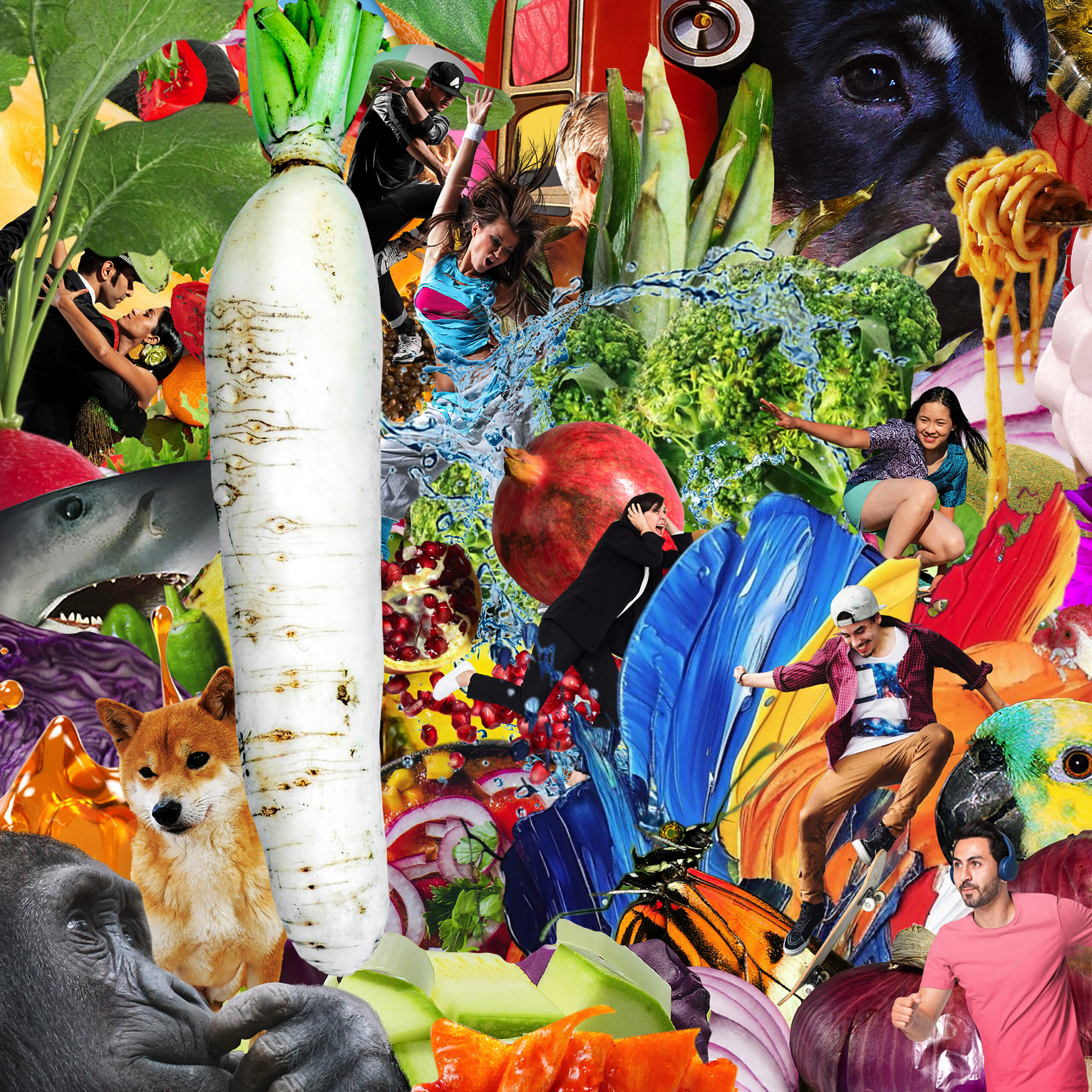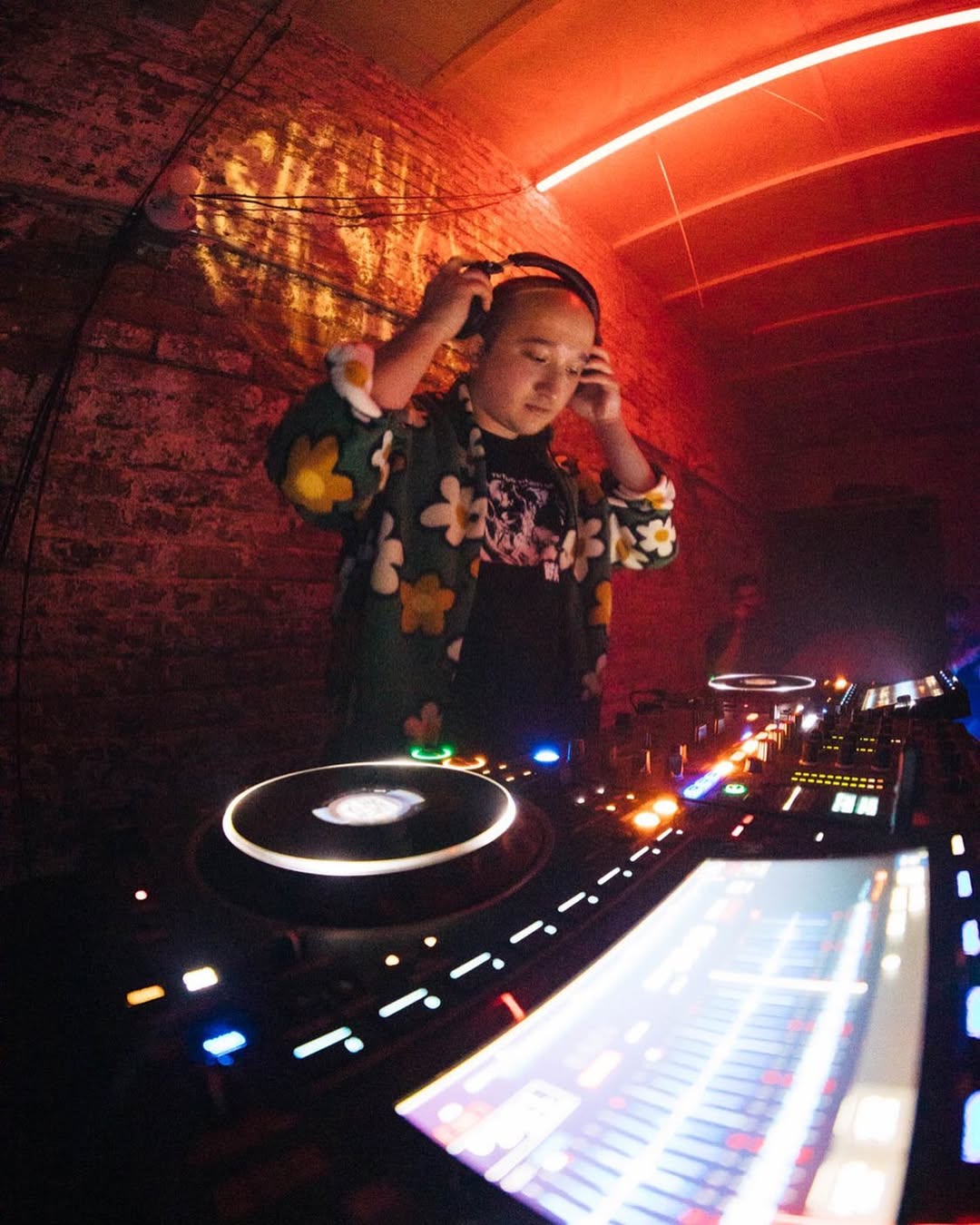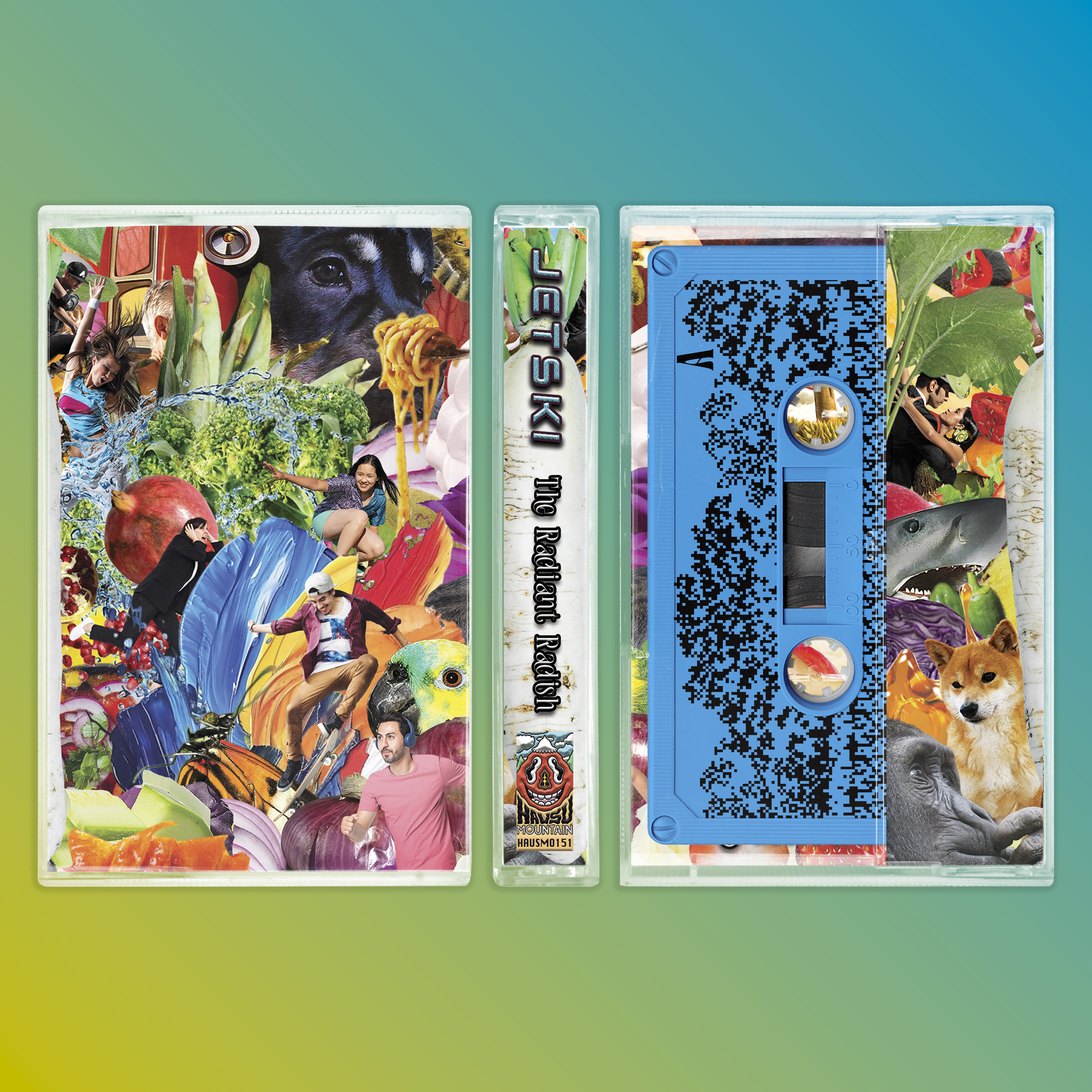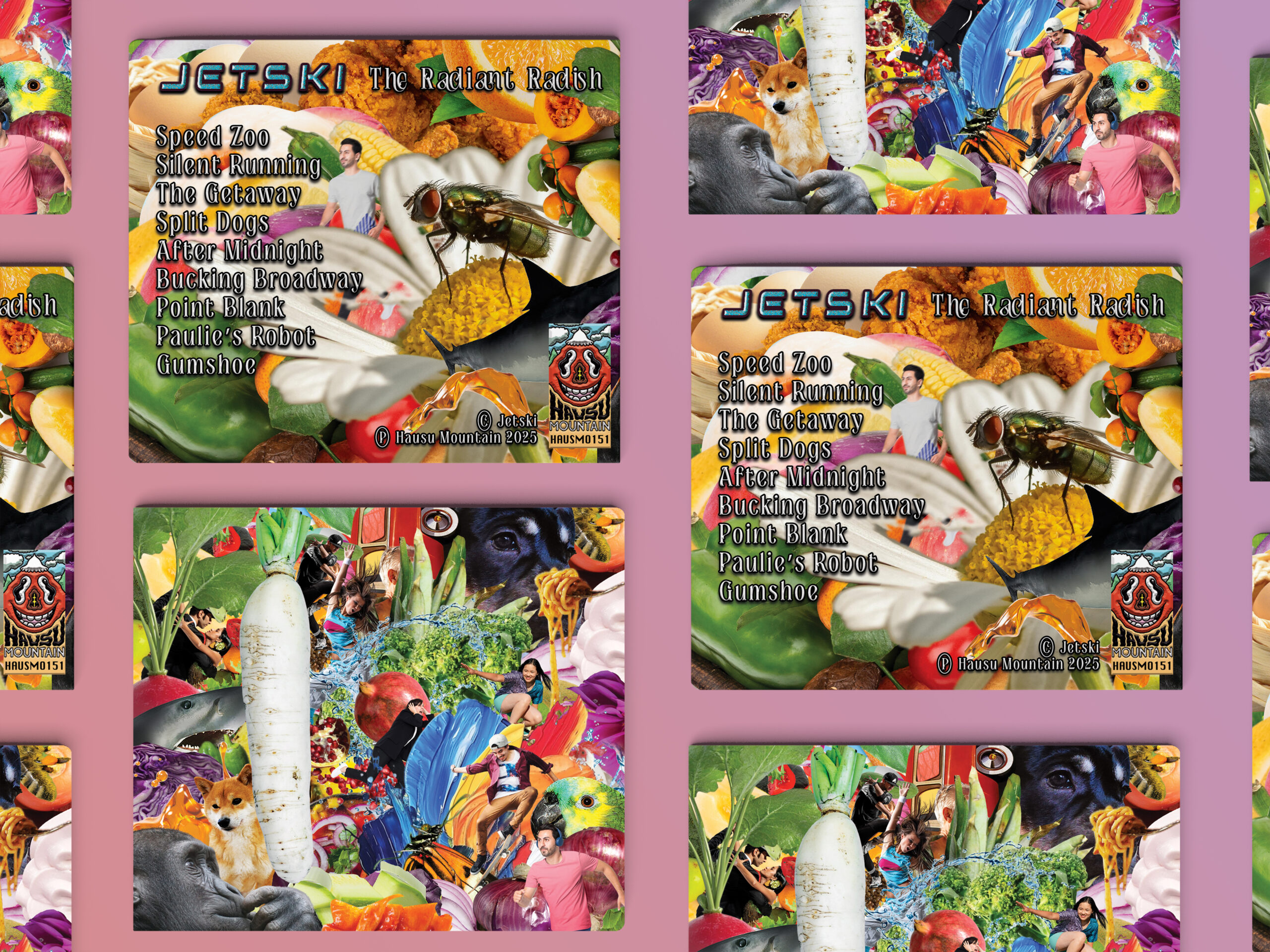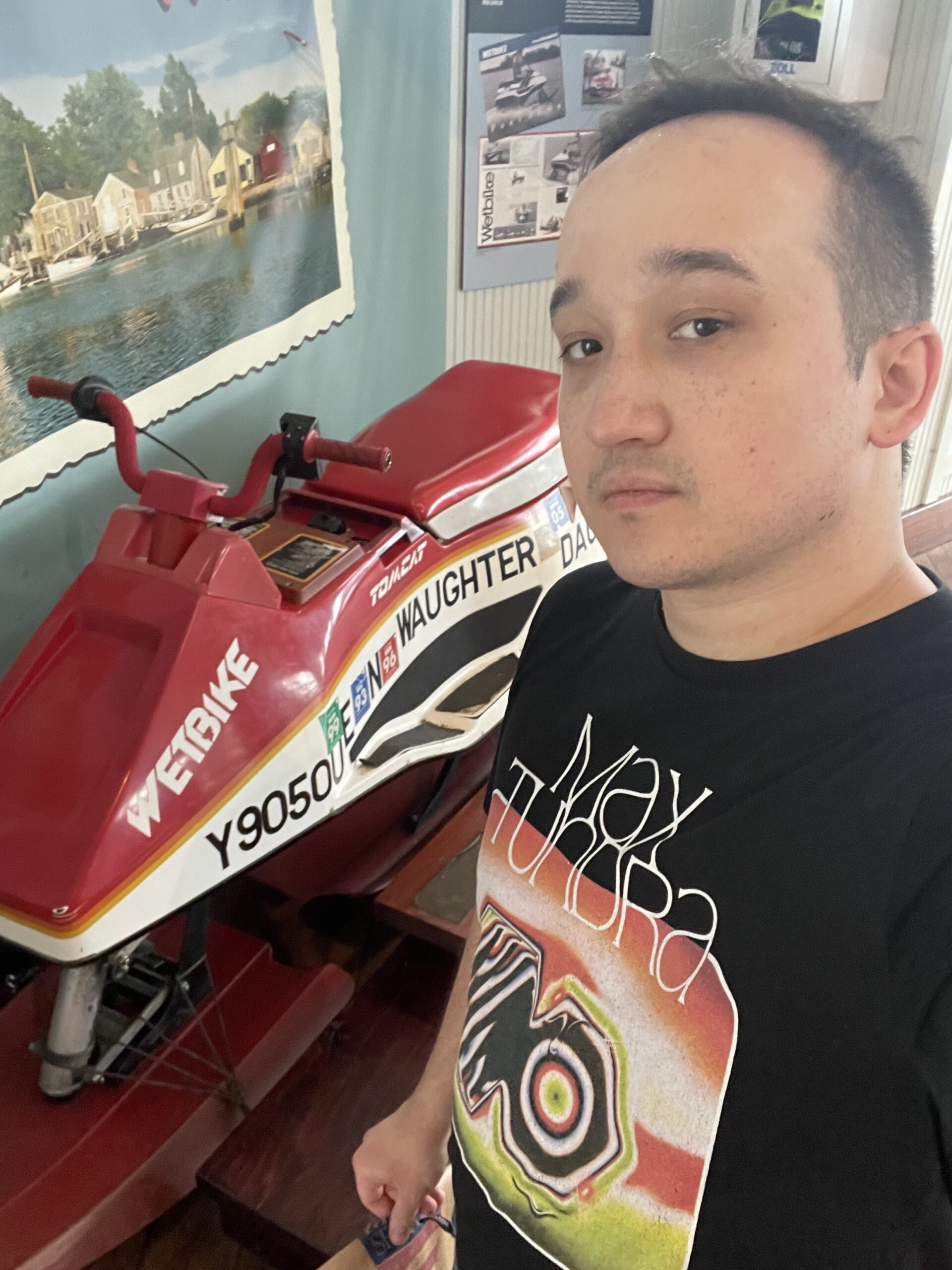–
–
To be released on CD, cassette and digitally on September 2nd, 2025. CD packaged in 4-panel gatefold digipak. Tape is a C47 on a sky blue shell with black imprints, packaged with a 2-sided 4-panel J-Card. This is the catalog page with album information and artwork. To purchase, head to our Bandcamp page.
–
–
Peoria, IL-based producer Ian Ostaszewski makes music under the name Jetski. His gonzo sample-based output manifests as overwhelming plunderphonic collages of juxtaposed sounds charged by complex webs of overlapping rhythms and head-spinning shifts in mood and timbre, all meticulously laid out to the point that it feels like you’re hearing a live band burn through a set of hyper-progressive music. The Radiant Radish, his first album on Hausu Mountain, follows his debut Reflex Engine (released on HausMo satellite label Blorpus Editions in 2022) with an awe-inspiring song cycle of freewheeling sample assemblage. He injects numerous fragments drawn from royalty-free sound libraries and public domain films – by his estimation somewhere between 4000 and 4500 samples – into composite takes that jitter with constant activity, performed live on his network of samplers running on iPads and iPhones. For all of his album’s ballistic sample-churning pandemonium, Jetski surprises us more with the sophistication and dream-logic organization of his arrangements rather than their disarray. With his relatively anonymous sources providing the constituent parts of The Radiant Radish, the album draws its manic power not from the potential of listeners pinpointing the origins of sounds or contextualizing them along a cultural timeline, but from the mind-bending narrative and morphing rhythmic reality of Jetski’s collages themselves on a moment-to-moment basis. We recognize the tones of individual instruments but can’t determine exactly what they’re playing as they crash into the mix in a disfigured fashion for a few seconds, just as we come to trace brief passages of rhythm made from staccato samples that speed by too fast to even attempt to identify. Before long, we give up trying to pick out anything at all and let Jetski’s tidal wave of sounds wash over us.
The only constant that The Radiant Radish establishes throughout its 45-minute running time is the total flux of unstoppable forward motion. The album proves as thrilling as it does confusing, hitting us like a barrage of cartoon explosions and sinking into pure electronic abstraction before coalescing into swooning melodies or legible dance floor-adjacent beat patterns. Detailing how he transitioned from drumming in jazz and rock bands into his current process of collage composition live-sculpted by his hands-on-sampler performances, Jetski explains, “If I had to draw a through line across my musical evolution, I think it’s my focus on rhythm and timing. My drumming background gave me the skills to subdivide and count rhythms and to feel the ‘pocket,’ and since then I’ve been preoccupied with manipulating and exploiting rhythm to create certain physical and emotional effects on the listener. I love the power of rhythm as a destabilizing force.” We feel this destabilization with each of Jetski’s frequent shifts in tempo and dynamic intensity, as our attention span has to instantly adapt to new sounds and rhythmic structures to keep up. Even when his production offers us longer passages with unifying elements that tether us to reality, like more legible basslines or drum loops, the menu of sounds that he plants over top of that foundation continuously cycles through new miniature permutations, like a jazz soloist pouring out an entire library of far-flung sounds from their horn as the band locks into a groove.
Though Jetski often uses randomizing algorithms to process and select samples from his arsenal of iPads and iPhones running the touch-responsive sampler application Koala, his collages are far from indiscriminate in their construction. He balances bass-heavy bursts, unfurling cascades of guitar and horns, and peals of upper register texture – while splashing everything with volleys of smeared sample mush that defy categorization. The sense that you’re listening to some semblance of a band performing, albeit an ensemble with dozens of disembodied players, testifies to Ostaszewski’s specificity in sound selection, along with his seamless translation of more conventional pop and rock sensibilities into the framework of free-for-all experimental collage. He cites playing DJ sets under his alter ego DJ Victor Borge as a source to, in his words, “draw inspiration from styles like house/techno and mainstream pop music. For example, making mashups and blends of pop songs has inspired my sampling practice because they’re both a form of sound collage. I think of pop music as a necessary counterbalance to experimental music. In my own music, I try to exploit the satisfaction of certain genre pleasures while also subverting certain elements through experimentation in order to give it my own style.” The Radiant Radish testifies that Jetski’s “own style” is, to put it lightly, bewildering to behold in action – like the entirety of the sounds available in the public domain transmuted into vegetables and blended into a smoothie with an unidentifiable yet somehow perfectly concordant mélange of flavors. In keeping with the collaged nature of The Radiant Radish, Ostaszewski himself created the album’s art – an amalgam of high-res images of plants and animals, along with a crew of stock photo humans emoting as they carry out their respective tasks. The art encapsulates the spirit of the album: would-be generic source material rendered into an intricate and vibrant mosaic through inspired recombination.

